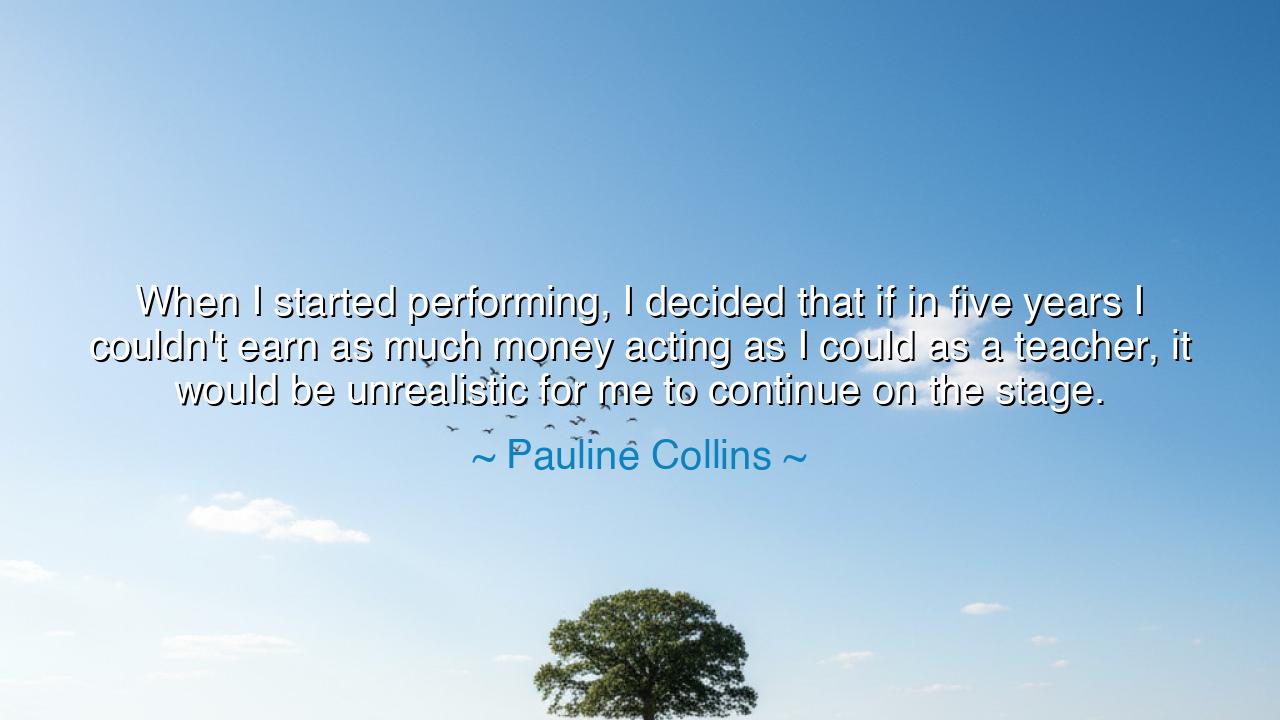
When I started performing, I decided that if in five years I
When I started performing, I decided that if in five years I couldn't earn as much money acting as I could as a teacher, it would be unrealistic for me to continue on the stage.






Hear now the words of Pauline Collins, who, before the world knew her name, stood at the crossroads of destiny and declared: “When I started performing, I decided that if in five years I couldn’t earn as much money acting as I could as a teacher, it would be unrealistic for me to continue on the stage.” Within this humble yet resolute vow lies the eternal struggle between dream and duty, between the fire of passion and the weight of necessity. It is the song of every soul who longs to follow the uncertain path of art, yet must reckon with the bread and shelter that life demands.
The teacher stands as a symbol of stability, of service, of steady wages and respect in the eyes of society. The actor, by contrast, walks upon uncertain boards, chasing roles, enduring rejection, and facing the possibility that years of toil may yield only shadows of glory. To weigh these paths is to feel the pull of both prudence and longing. Collins, with clarity, bound herself to a time of testing: five years. If fortune did not open its gates within that span, she would lay aside the stage and take up the classroom. This was no surrender, but wisdom—an agreement between heart and mind, between passion and survival.
History, too, speaks of such moments. Consider the story of Vincent van Gogh, who sought to live as an artist though poverty clawed at him daily. He chose the brush over all else, yet without such a vow of practicality as Collins made, his life descended into misery, his art unrecognized until after death. His passion burned, but his body and spirit suffered under its cost. From his tale we see the danger of a dream unmoored from reason. Collins, in contrast, sought to anchor her dream with a boundary, to protect herself from ruin even as she pursued the fire of the stage.
Yet there is also the tale of Alexander Hamilton, who as a youth swore that he would rise from obscurity and achieve greatness within a limited span of years. He measured his ambition by time, forcing urgency into his actions, and by doing so, turned from orphan into architect of a nation’s treasury. His vow mirrors Collins’s: the recognition that greatness must be proven within a span, or else a new path must be sought. Such vows are not chains, but catalysts—they push us to act with fervor, for the clock is always ticking.
The stage itself is an altar of sacrifice. To stand upon it is to give one’s soul, one’s voice, one’s body to the judgment of strangers. Few who begin remain, for the cost is too great. Collins knew this truth and faced it not with naïve hope, but with sober courage. She gave herself the gift of time, neither abandoning her dream too quickly nor clinging to it forever in futility. Her words remind us that passion must be balanced with discernment, and that even the loftiest of dreams must be tested in the crucible of reality.
But let us not mistake her vow for lack of faith in art. Rather, it reveals the profound respect she held for it. For if she could not live by it, she would not profane it by treating it as a mere hobby. To her, acting was not play, but calling; and a calling must be honored by full devotion or not at all. Thus, she placed before herself a measure: either the art would sustain her life, or she would serve through the noble path of teaching. Both are dignified, but one must prevail.
Therefore, O listeners, take this lesson: dreams are holy, but so too is wisdom. Do not abandon your passion, but also do not follow it blindly into ruin. Set yourself a season of trial, a span of years, and within it give your all, heart and soul. If the dream takes root and bears fruit, rejoice. If not, do not call yourself defeated, but recognize that you have gained strength, discipline, and clarity to serve in another path. For no effort poured into passion is wasted; it shapes the soul whether it yields gold or not.
Practical counsel I give: when you pursue your dream, bind it with both fire and measure. Write a vow to yourself, as Collins did, setting time and limits, not as shackles but as guiding stars. Live with full devotion in the span you have given, and should you need to turn, do so with dignity, knowing you honored your dream with action and not with idle wishing. In this balance of passion and prudence lies the path of the wise—and perhaps, as with Collins, destiny will smile before the years are done.






AAdministratorAdministrator
Welcome, honored guests. Please leave a comment, we will respond soon